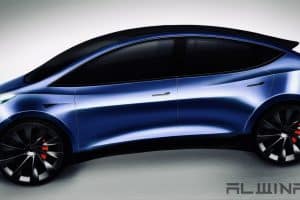CAFE penalties — those costs associated with automakers that fail to meet Corporate Average Fuel Economy standards — are under scrutiny right now. The Biden administration and a US appeals court are under pressure to move quickly to raise civil penalties for automakers failing to meet fuel economy requirements. At stake could be up to $1 billion annually, according to Reuters, both for failing to meet the rules and higher prices for credits used to meet the rules.
All-electric vehicle manufacturer Tesla sells credits to other automakers to help them meet government vehicle emissions requirements. Tesla argues that the value of those credits are diminished due to changes in rules made by former President Donald Trump’s administration.
Transportation is the largest single contributor of US greenhouse gas emissions, surpassing the electric power industry in 2016 for the first time. By 2019, transportation accounted for about 29% of total US greenhouse gas emissions.
CAFE standards regulate how far vehicles must travel on a gallon of fuel and are tied in with regulatory credits. In a push to reduce carbon emissions, governments around the world have introduced incentives for automakers to develop electric vehicles or very low-carbon emitting cars. Credits are given to carmakers that build and sell environmentally friendly vehicles.
The federal CAFE standards, combined with greenhouse gas (GHG) standards, are the primary mechanisms through which the US federal government regulates GHG emissions from the transportation sector. Beyond emissions reduction objectives, the standards are also intended to improve the nation’s energy security and enhance the welfare of consumers.
The Chronology of CAFE Considerations
Corporate Average Fuel Economy standards were introduced in 1975 as part of the Energy Policy and Conservation Act, with the purpose of reducing energy consumption by increasing the fuel economy of cars and light trucks.
The standards were raised during Barack Obama’s presidency, from a requirement of 24.1 miles per gallon in 2011, to a projected goal of 54.5 miles per gallon by 2025.
In 2012, the federal government issued regulations that required automakers to meet progressively more stringent fuel economy and GHG for the 2017–2025 period. Separately, the State of California and 9 other states required automakers, during the same time period, to sell an increasing percentage of zero-emission vehicles.
Fiat Chrysler Automobiles paid nearly $150 million for failing to meet 2016 and 2017 requirements.
2020 research indicates that more stringent fuel economy standards increase the rate of technological improvements in new passenger cars.
In January 2021, the Trump administration delayed a 2016 regulation that more than doubled penalties for automakers failing to meet CAFE requirements. The move was seen as having the possibility of saving the industry hundreds of millions of dollars or more. Instead, the Trump administration set the effective date as the 2022 model year. The announcement came just 8 days before President-elect Joe Biden took office.
The Second Circuit US Court of Appeals rejected Tesla’s request in April for immediate action pending NHTSA’s review.
President Biden instructed the Environmental Protection Agency (EPA) and Department of Transportation to propose new rule making surrounding the advancement of fuel efficiency standards in the auto industry. This is an effort to change what a senior administration official called “harmful rollbacks” of CAFE standards put into place by the Trump administration. “Corporate Average Fuel Economy Standards for Model Years 2024–2026 Passenger Cars and Light Trucks” was signed on August 5.
On August 10, NHTSA proposed to amend the CAFE standards set in 2020 for passenger cars and light trucks manufactured in model years 2024–2026. The standards would increase in stringency at a rate of 8% per year rather than the 1.5% year set previously. This proposal also responded to President Biden’s directive in Executive Order 13990 to reconsider the CAFE standards finalized in 2020.
Stellantis said in August that costs related to potential higher CAFE penalties could be about $609 million.
On August 18, the NHTSA issued a notice saying it could impose higher penalties for prior model years for automakers failing to meet fuel efficiency requirements but will first consider public comments.
On August 27, Tesla requested again that the Second Circuit US Court of Appeals to quickly reinstate higher penalties.
Tesla met virtually on Aug. 30 with officials from the National Highway Traffic Safety Administration (NHTSA).
NHTSA proposal is published in the Federal Register on September 3.
The State of CAFE Standards Today
“The uncertainty perpetuated by NHTSA’s sluggish rulemaking pace is thus compounded by the likelihood of yet another round of litigation,” Tesla wrote, adding that uncertainty “may linger for several more years.”
Now NHTSA is considering reinstating the Obama rule. The government memo indicated that Tesla suggested NHTSA withdraw Trump’s action immediately, saying it “produces continuing uncertainty in investments and transactions across the industry, and any delays will continue to have deleterious effects on the credit market until the issue is resolved.” It added Tesla believes “any delays will continue to have deleterious effects on the credit market.”
A group representing major automakers including General Motors, Toyota Motor, Ford Motors, and Volkswagen asked the court to reject Tesla’s request. “That Tesla might benefit from more certainty about the worth of the CAFE credits that it has amassed is hardly a reason to cut off an ongoing administrative process,” the group wrote in a court filing.
NHTSA announced a virtual public hearing to be held October 13, 2021 on its proposal for the “Corporate Average Fuel Economy Standards for Model Years 2024–2026 Passenger Cars and Light Trucks.” This hearing also allows the public to provide oral comments regarding the Draft Supplemental Environmental Impact Statement that accompanies the proposal. An additional session will be held on October 14, if necessary, to accommodate the number of people who sign up to provide oral comments. Each commenter will have 3 minutes to provide oral testimony.
Final Thoughts about Tesla’s Days in Court
Research indicates that a fuel economy standard is shown to be at least 6 to 14 times less cost effective than a price instrument (fuel tax) when targeting an identical reduction in cumulative gasoline use. The premise is supported by the US government, suggesting that it is also possible to think that even if consumers are responsive to changes in gasoline prices, they are still myopic with respect to choices of vehicles that have technological advances. Progressive CAFE standards may serve as symbols that reflect and awaken consumers to cost and environmental savings.





